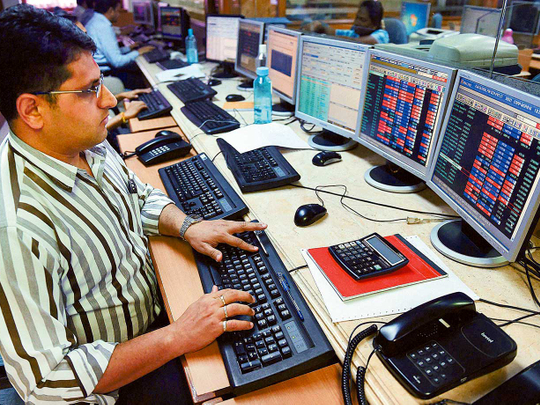
Mumbai: Indian equities tumbled to 21-month lows, sending the benchmark stock index into a bear market, as disappointing earnings added to concern about increasing outflows and the global economic outlook.
The S&P BSE Sensex slumped 3.4 per cent to 22,951.83, the lowest close since May 2014. The gauge has fallen 23 per cent from its January 2015 record, meeting the common definition of a bear market, to join stock benchmarks from Tokyo and Shanghai to London and Frankfurt. About $365 billion has been erased from stocks’ value from last year’s record level.
The slump has ended a 1,514-day bull market run, the nation’s longest ever. Overseas investors withdrew $1.9 billion from local shares this year, turning sellers after four years of net purchases, as turmoil in Chinese stocks and a 56 per cent plunge in US oil prices over the past year coincided with fading enthusiasm for Prime Minister Narendra Modi’s economic agenda as opposition parties blocked legislation, including a bill to implement a national sales tax.
“The Indian economy and stock markets are not decoupled from the global economy, and if China slows down, then we cannot be immune to it,” Saurabh Mukherjea, chief executive officer of institutional equities at Ambit Capital Pvt. in Mumbai, said in an interview. There’s “high probability” of the Sensex falling to 22,000 in the next three to six months, he said. The forecast implies a drop of 4 per cent from Thursday’s close.
Earnings Disappoint
The Sensex last entered a bear market on Nov. 5, 2010, according to data compiled by Bloomberg. The gauge rebounded from its low in December 2011 and rallied 57 per cent through to Wednesday. It trades at 14 times its projected 12-month earnings, compared with a multiple of 10 for a gauge of emerging markets.
“Emerging-market funds are facing redemptions and India is still overweight among these funds, and that’s a negative,” Sanjeev Prasad, the Singapore-based co-head and senior executive director at Kotak Institutional Equities, said in an interview with Bloomberg TV India on Thursday. “Valuations have become reasonable, but I don’t think anybody has the confidence to buy because money is constantly flowing out of EM funds.”
Lacklustre earnings has added to the selling pressure. Fifty-two per cent of the 25 Sensex companies that have posted December-quarter results so far have exceeded estimates, compared with 57 per cent of index members in the three months to Sept. 30, and 60 per cent in the prior quarter, data compiled by Bloomberg show.
Bad Debts
“With recovery in corporate earnings several quarters away, only a sharp correction in prices can justify buying into this market,” Venkat Subramanian, who manages a 20 billion-rupee ($290 million) long-short fund at Infina Finance Pvt., said in a phone interview from Mumbai. “We will look at building net long positions if the benchmark indices drop another 8 to 10 per cent.”
Banks have suffered among the biggest losses, with a gauge of 12 state-owned lenders trading at 0.5 times its book value, an all-time low. State Bank of India, the largest by assets, is the worst-performing stock on the Sensex this year, after slumping 28 per cent in 2015. SBI’s net income slumped 62 per cent to 11.2 billion rupees for the quarter ended December, from 29.1 billion rupees a year ago, the lender Thursday.
While India’s economic growth picked up to 7.2 per cent in 2015, the nation’s lenders are reeling under bad debts of as much as $59 billion that they have to clear from their books by March 2017. The banks have been given incentives by Reserve Bank of India to speed up loan write-offs and must meet tighter international capital standards.
“The banking system has more pain to come from the extra provisioning on the current stressed assets and from further stressed-asset developments,” Ambit’s Mukherjea said. “Growth and earnings expectations for next year will get pulled back as the pain spreads to the rest of the economy.”
ICICI Bank Ltd, the largest private sector lender, posted slowest quarterly profit growth in six years in the same period. State-owned Punjab National Bank reported a 93 per cent slump in fiscal third-quarter net income, while Allahabad Bank and Central Bank of India reported losses.
’Bright Spot’
Investors shouldn’t pass up an opportunity to buy stocks at the cheapest valuation in 21 months, given the economy’s growth outlook, said Madhusudan Kela, the chief investment strategist at Reliance Capital Ltd, which runs India’s third-biggest mutual fund.
The government forecasts gross domestic product to grow 7.6 per cent in the year through March, overtaking a slowing China, versus 7.2 per cent a year ago. China grew 6.9 per cent in 2015, Russia contracted 3.7 per cent and Brazil is forecast to shrink 3.7 per cent. The Sensex trades at 14.7 times its projected earnings, near the cheapest since September.
“We’re talking of growing at 7-8 per cent while the world is talking of deflation,” Kela said in an interview with Bloomberg TV India. “What’s happening globally will affect us in the short term. That’s volatility, not risk. India remains a bright spot.”












